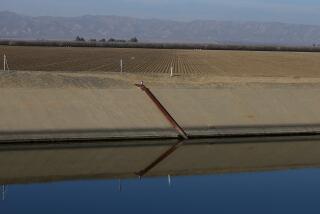Seattle becomes the first city to sever ties with Wells Fargo in protest of Dakota Access pipeline

Two multi-billion-dollar oil pipeline projects revived by President Trump by executive order would create fewer than 100 permanent jobs.
- Share via
Reporting from Seattle — With supporters carrying signs saying “Make big business pay” and Native American activists performing an “honor song” in gratitude, the Seattle City Council on Tuesday voted to make this the first city in the nation to ends its relationship with a bank in protest of the Dakota Access pipeline.
The nine-member council unanimously approved an ordinance to end its nearly two-decade relationship with its primary financial services provider, Wells Fargo, which is an investor in the pipeline and the company building it, Energy Transfer Partners of Texas. The bank handles about $3 billion a year for the city.
Yet questions over how effective such a move might be rose even before the hearing began, when the U.S. Army Corps of Engineers, following instructions from President Trump, informed Congress earlier Tuesday that it planned to issue the final easement for the pipeline as soon as Wednesday.
The $3.8 billion, 1,170-mile pipeline would travel from North Dakota to Illinois, with the most controversial segment running beneath a dammed section of the Missouri River just north of the reservation of the Standing Rock Sioux Tribe. The tribe, which says the pipeline threatens its water supply and sacred sites, said Tuesday it would continue to fight the project’s completion.
Hundreds of protesters remain in snowy camps near the planned river crossing in North Dakota — a fact noted by many people in the far more comfortable City Council chambers.

“It really moves me to think of the people who are hundreds of miles away from us today, waiting in the cold for our vote,” Lisa Herbold, a council member, said shortly before the vote.
Seattle, which is thriving on science and technology a thousand miles west of the pipeline’s route, would not seem to suffer obvious impacts if the pipeline were completed. But the city is deeply liberal, environmentally minded and riding a wave of activism that has put it at the forefront of social and economic causes — most recently as the location where state lawyers persuaded a federal judge, appointed by George W. Bush, to order a stay of President Trump’s travel ban.
The area also has a large Native American community that has actively opposed the pipeline, and one member of the council, Debora Juarez, is an enrolled member of the Blackfeet Nation tribe in Montana. Another council member, Kshama Sawant, is a socialist.

Sawant, whose supporters filled the chambers on Tuesday, had pressed her colleagues for weeks to cut ties with Wells Fargo.
“The example that we have set today can be a beacon of hope to activists all around the country seeking to change the economic calculus of corporations who think that investing in the Dakota Access pipeline will be good for their bottom line,” Sawant said after the vote. “We’re making it bad for their bottom line.”
Her supporters, the predominant group at the standing-room-only hearing, began a chant as they filed out just after the vote: “When we fight, we win!”
Wells Fargo is one of 17 investors in the pipeline. The company says it has loaned about $120 million of the $2.5 billion that Energy Transfer Partners has borrowed to build it. Critics say the figure is far higher and note that Wells Fargo provides several other services for Energy Transfer Partners.
The ordinance passed by the council cites information from the Securities and Exchange Commission showing that the bank has supplied $347 million in credit to the companies building the pipeline and administers a $3.7-billion line of credit held by Energy Transfer Partners, among other investments.
The bank issued a statement after the vote, saying: “While we are disappointed that the city has decided to end our 18-year relationship, we stand ready to support Seattle with its financial services needs in the future.
“We will continue investing in this diverse and dynamic community that Wells Fargo has been devoted to since 1859. We will continue to support affordable housing and strengthen Seattle neighborhoods. We will continue to give back through volunteerism and corporate philanthropy. And we will continue to invest in entrepreneurship and help create jobs as the No. 2 small business lender in Washington.”
The City Council’s move raises many questions, not least where Seattle will be able to put its money and feel good about it. In addition to citing the Dakota Access pipeline, the ordinance includes language strengthening policies on “socially responsible banking” that are intended to address Wells Fargo’s fraudulent banking practices that have been well-publicized over the last year.
Whether any of the major national banks will meet those new standards is unclear, as is whether small local banks or credit unions have the capacity. Councilman Mike O’Brien expressed support for Washington to establish a state-owned bank, a proposal also being pushed by a state lawmaker in Olympia. Others have talked about a city-owned bank.
The city will not end its relationship with the bank immediately. The ordinance says instead that it will not renew its contract with the bank when it expires at the end of 2018.
“Our responsibility is to change our checkbook provider, if you will, our banking services provider,” Glen Lee, the city’s finance director, said in an interview before the vote. “We will execute that. Hard or not, that’s what we’ll do. That’s our job.”
Twitter: @yardleyLAT
ALSO
Journalist faces charges after arrest while covering Dakota Access pipeline protest
More to Read
Sign up for Essential California
The most important California stories and recommendations in your inbox every morning.
You may occasionally receive promotional content from the Los Angeles Times.











